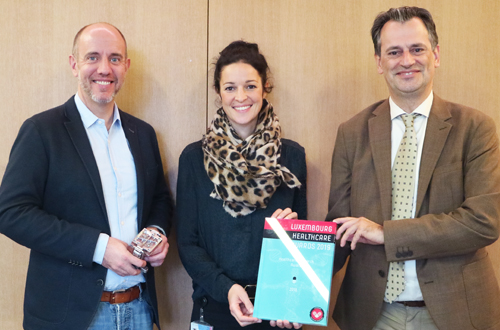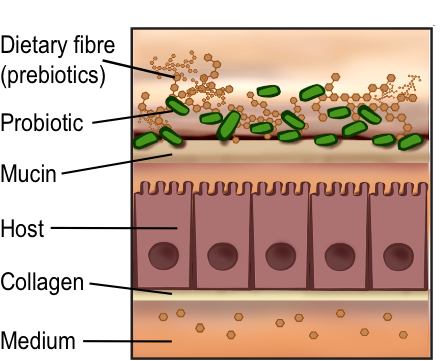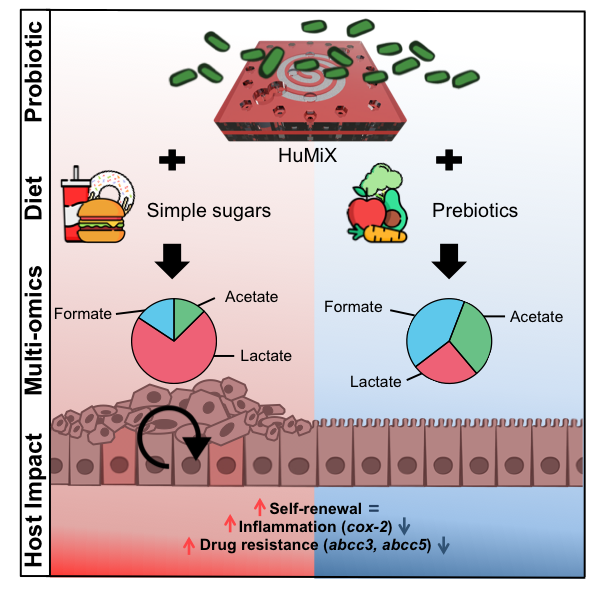On October 9, during the Luxembourg Healthcare Summit, the start-up project “HuMiX Biosciences” of the Eco-Systems Biology group at the University’s Luxembourg Centre for Systems Biomedicine (LCSB) was awarded the 2019 Healthcare Research Award. Their work focusing on the effect of specific dietary regimens on colorectal cancer, provides a better understanding of diet-microbiome-cancer interactions and opens new avenues for personalised anti-cancer treatment approaches in the future.
Each year, the Luxembourg Healthcare Summit brings together national and international actors from the healthcare and life sciences sectors for an afternoon of talks and discussions. The event is also the occasion to reward the best practices implemented during the year and the teams who made innovative contributions to the field. Amongst the five prizes, the Healthcare Research Award is given to a research project which brings about a major improvement to the sector.

Left to right: Paul Wilmes, Kacy Greenhalgh and Kris Ver Donck
The microbiome of the human gastrointestinal tract plays essential roles in maintaining human health. Several scientific studies suggest that administration of certain microorganisms (probiotics) together with specific dietary components (prebiotics) could be used as a supportive therapeutic option in the treatment and management of a variety of diseases, including colorectal cancer. “Diet exerts crucial effects on cancer progression and therapies and thus dietary interventions as well as microbiome manipulations can influence anti-cancer treatment efficacy. The exact mechanism how dietary components and the gut bacteria affect cancer outcome are unknown,” explains Dr Kacy Greenhalgh, post-doc within the Eco-Systems Biology group and the lead author of the study.
in vitroin silico They worked with HuMiX, a unique Greenhalgh et al., 2019 model of the gut developed by the group, which allows the cultivation of human intestinal cells together with bacteria under in vitro-like conditions. “HuMiX allows us to investigate in a controlled manner the effects of evidence-based dietary regimens on gut microbiome and host drug response,” details Kacy Greenhalgh. Their results showed that a combination of dietary fibre and specific beneficial bacteria reduces the expression of pro-carcinogenic and drug resistance genes in cancer cells. They demonstrate the potential of this approach for the formulation of personalised dietary supplements including pre- and probiotics (in vivo), which will now be tested further.


Diagram of the in vitro human cells-microbe gut-on-chip model HuMiX, with three chambers separated via nano- and micro-porous membranes.
Specific diets together with beneficial microorganisms induces down-regulation of pro-carcinogenic and drug resistance genes, as well as metabolic changes that affect the growth of cancer cells, and may help treat colorectal cancer.The team now aims to commercialise the HuMiX technology and to work with industrial partners. They for example plan to test bacterial communities and cancer cells derived from patients, together with chemotherapeutic drugs, to identify further dietary regimens that decrease the progression of colorectal cancer. “The HuMiX model offers us the opportunity to explore disease mechanisms and novel methods for treatment taking advantage of the interaction between microbiome, nutrients and patient as was not possible before,” points out Kris Ver Donck business developer and CEO for HuMiX Biosciences. In the future, the researchers will keep exploring the significant potential of the food-microbiota axis for therapeutic purposes.
